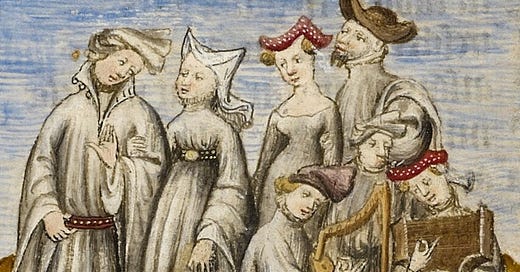“I Love Singing and Laughter, and the World Is the Better For It”
Puritanism vs. the Middle Ages
In these three words—“It is a joy, a bliss, and an endless pleasure to me”—were shown to me three heavens, as thus: for the joy, I understood the delight of the father; for the bliss, the honoring of the son; and for the endless pleasure, the holy ghost.
—Julian of Norwich, medieval anchoress and mystic
In Sunday’s post, I wrote that
the West’s recurrent conflicts between puritanical and non-puritanical forces mirror a fundamental and continual tension that is woven into the very fabric of human thought and consciousness: should I seek pleasure, or renounce it? indulge myself, or deny myself? satisfy the senses, or the intellect? live like an animal, or like an angel—or like a god?
Could we not say that the puritanical impulse goes back, in some form, to the very beginning? We think, and rightly so, of Adam and Eve’s sin in terms of pleasure—an act of disobedience provoked by the carnal appetites: “the woman saw that the tree was good for food, and that it was a delight to the eyes…” But we must also remember what the serpent said immediately before Eve “took of the fruit thereof, and did eat”:
the day ye eat thereof, then your eyes shall be opened, and ye shall be as God, knowing good and evil.
It is telling that another name for England’s puritans was “the godly.”
Puritanism was, on the one hand, a legitimate zeal to be free of sin and carnal degradation, and on the other, an insidious attempt to deny that human beings are human. I say “insidious” because the underlying disorder here is a prideful conviction that, to quote the Pharisee in the Temple, “I am not as the rest of men,” and the result is an imbalanced spiritual state in which the puritanical believer seeks, in unrealistic and inhuman ways, to “be as God.” In other words, the puritanical urge shares, to a disturbing extent, in the same urge that drove mankind out of Eden.
If your preferred translation of Scripture is the Challoner Bible (typically called the Douay-Rheims), this detail in the Genesis story might not be familiar to you: “when the woman saw that the tree was good for food, and that it was a delight to the eyes, and that the tree was to be desired to make one wise, she took of the fruit thereof.” The Challoner rendering, which follows the Vulgate (and the Septuagint), is “fair to the eyes, and delightful to behold.” Without getting into debates about how exactly the original Hebrew should be interpreted, I will say that a strong case can be made for the “make one wise” translation, and it is at least worthy of reflection.
Keep reading with a 7-day free trial
Subscribe to Via Mediaevalis to keep reading this post and get 7 days of free access to the full post archives.





